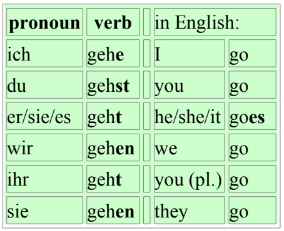Basics of verb conjugations in German

Introduction to verb conjugations in German
In this lesson , you will learn verb conjugations in German . In German , every grammatical person has, or potentially has, its own unique verb form . Describing the various verb forms is called verb conjugation in German . This variation in verb form is certainly one of the things that makes German grammar somewhat difficult for English speakers to learn . In English , only the 3rd person singular might differ from the verb form used with all of the other persons and that difference is made by adding an ending of ‘s’ or ‘es’ . For example : I/you/we/they ‘go’ , but he/she/it ‘goes’ .
Let us have a closer look at German verbs . Usually , the infinitive form of a verb in German ends with –en—for examples , consider these verbs you have already learned : gehen (‘go’), haben (‘have’), and studieren (‘study’) . In order to “build” the different verb forms (that is, conjugate a verb) , first cut off the ‘-en’ ending from the infinitive . Then append a new ending according to the grammatical person .
For regular verbs it works essentially as follows :

As you see in this example using the verb gehen , the singular 1st person ends with -e , the 2nd person with -st and 3rd person (no matter what gender) ends with -t . As for the plural forms , note that 1st and 3rd person in plural number are built the same way as the infinitive . Again note that , in English , only the verb form for the 3rd person singular is “unique” . An easy way to remember the regular verb endings is the following mnemonic “Elephants standing together enjoy trumpeting endlessly” .
Seems simple enough . However, realize we are discussing here only the regular verb forms in the present tense. You will learn quite soon that , unfortunately , there are many exceptions from these simple rules . An important one is the irregular verb sein (‘to be’) which is irregular in English as well (I am, you are, he is….) .

![]()
At least 1st and 3rd person plural are the same . Another important verb is haben (‘to have’) :

You see , it’s not too irregular—only the 2nd and 3rd person singular constitute a small exception since the ‘b’ has vanished . English is somewhat curious in this respect as well: ‘I have’, but ‘he has’ . Future lessons will introduce you to the many irregular verbs in German . But you should now recognize what is happening to the verbs in German sentences . They are reflecting the person and number of their nominative case subjects . Recall these sentences from past lessons :
- Danke , es geht mir gut → Thanks, it goes well with me (verb is gehen)
- Ich habe viel Arbeit → I have much work (verb is haben)
- Ist er zu Besuch? → Is he visiting? (verb is sein)
- Du bist ein Schwein! → You are a pig! (verb is sein)
- Wie heißen Sie? → What are you called? (verb is heißen, and pronoun is formal)
- Wir spielen eine Stunde lang! → We play for one hour! (verb is spielen)
- Sie liegt am Ausfluss des Zürichsees. → It lies at the outlet of Lake Zurich (verb is liegen)





























